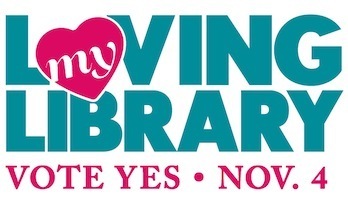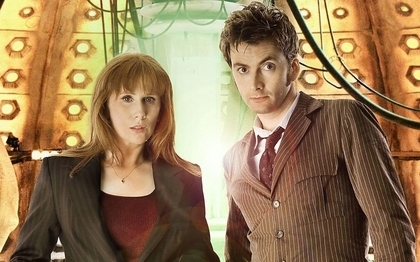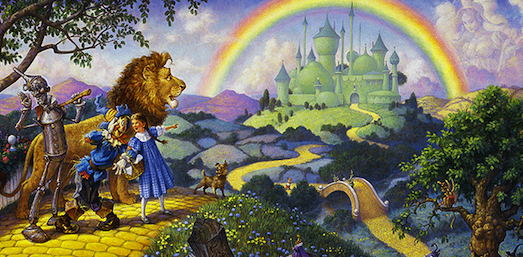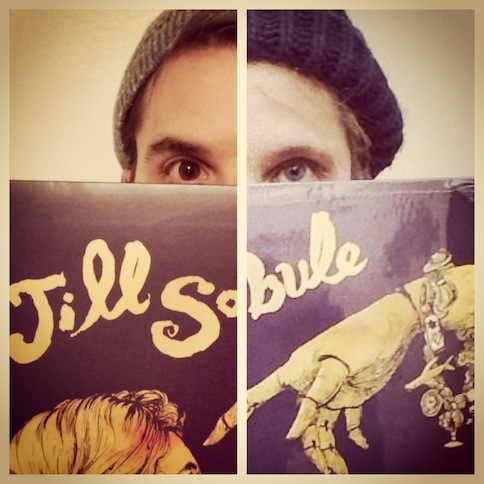Matthew Aaron Browning's Blog, page 5
October 26, 2014
Loving My Library
On Friday, I headed downtown during my lunch break to practice that most fundamental of rights: voting. There are plenty of hot-button issues on the table politically right now, and plenty of hotly contested races to fill many a smear campaign ad. While I certainly had my political leanings in tow when I drove to the early-voting site, there’s another issue – on the back of that ballot – for which I was very interested in exercising my right to fill in a little circle on a sheet of paper.
A (much more feasible and better conceived) levy is being proposed that would restore $3 million in slashed funding to Kanawha County Public Library.
In case you missed it, last year the West Virginia Supreme Court ruled that Kanawha County Schools no longer had to fund the library system, resulting in a 40 percent cut to the operating budget. Decreased funding means decreased services, hours, staff – possibly even branches. Now at some libraries if a staff person calls in sick the place doesn’t open. That’s not good, folks. And, following the ruling, one of the first things to go was the popular West Virginia Book Festival, which had become strong enough in recent years to lure the likes of Charlaine Harris and Dave Pelzer, among others, to our fair city. That one still stings.
You may be saying, “But nobody even goes to the library, so why should I care?” Not so. Last year, between book loans and downloads, numbers passed the 1 million mark. And book loans are only part of the mix. Internet access, educational programs and activities, movie rentals – I even got my passport at my neighborhood library. Libraries aren’t simply books anymore. They’re community centers and knowledge access points.
Last year a different levy was on the ballot to restore this missing money. Unfortunately it was tied to the school board, was much larger in its amount and would’ve cost the taxpayers considerably more than the updated proposal. Not surprisingly, it was overwhelmingly voted down. This time around, instead of paying upwards of $100+ a year, the average taxpayer will pay about $16 annually, or around $1.36 per month. Seriously. That's it. Isn’t it worth a buck and some change to keep our library branches open and fully operational? I spend more than that a day on coffee.
Supporters have been campaigning hard for this new levy, from advertisements to social media to the group of friendly volunteers smiling and waving at the intersection near my house each evening. There are plenty of ways you can help spread the word, too. Learn more about the levy, how you’ll be affected if it passes and how you can help at LovingMyLibrary.com.
And remember to #VoteYesNov4!
September 19, 2014
When Your Book Doesn’t Sell
Listen up, aspiring writers. Here's something you may not know: Having an agent is no immediate guarantee that a manuscript will sell. It could find a publishing home in a matter of minutes or it could float around in submission purgatory for a year or two. A tough lesson to learn is that, should the latter be your book's fate, it isn't because you're a bad writer with a bad book and a bad agent. Well, I guess it could be any or all of those things, but probably not.
"Hang on," you're probably saying. "Isn't signing with an agent a fast track to publication? What's the problem here?"
No, it isn't a fast track. In fact, I don't think any part of traditional publishing isn't glacial. There is no fast track. None. Nothing. Nada. Zippo. Zilch.
Soon after I signed with an agency, the days and months ticked by as my first book made the rounds to editors. The feedback was fairly consistent: "I love A, B and C about this book, but D and E is ultimately why I'm going to pass."
With each rejection, as nicely as they were written, a little of my confidence was chipped away. Am I not any good at this writing thing? Do I suck? They seemed to like a lot about the book, and their hang-ups could be addressed and improved upon, right? Surely someone will take a chance on this book I've spent so much time pouring my heart and soul into!
Eventually my agent and I decided to hit the brakes on submission of that book, take the feedback we'd gathered and revise. It was a blow to the ego for the book not to sell – after I'd gotten so excited, after I'd bragged to all my friends and relations that I'd signed with an agency, after I claimed to really be on my way.
I distracted myself from those distracting thoughts of failure by diving headfirst into a second book. Eventually I finished that book and it entered the submission phase. It's still there. Still unsold.
I revised that first book. It has reentered the submission phase. It's still there. Still unsold.
I'm writing my third book. It's going fairly well. I like it. I feel good about it. But those distracting thoughts of failure I just mentioned…yeah, they're still there.
Yesterday, I read fellow scribe and agency mate R.L. Saunders's post about this very subject, this "book not selling" thing. It is a perfect description of the emotional rollercoaster that is this process. It isn't all gloom, despair and agony, though. My favorite part is her list of good things that have happened. I echo them all, and will add a couple more that I've experienced.
I've corresponded with some really terrific folks. Writers are, by and large, honest, caring, eager people willing to connect, help and support one another. I've built a nice little platform for myself. I've connected with writers I admire. When I first started the agent hunt, I was a fan of writers like Brent Hartinger and J.H. Trumble, who write books like the ones I write. Now I'm a fan who corresponds with these people. We're friends'ish (I say "ish" in that sense that we talk online but I've never met them in person.) Brent was even nice enough to ask me to contribute to his Real Story Safe Sex Project. I value these relationships, connections and opportunities very much.
Would I change what has been my process if I could? Well, hey, it would be nice to have sold a book more quickly. I won't pretend otherwise. But I can't change it, so why dwell on it? I like where I am. I'm a better writer than I was when this started. I'm a better person for the experiences it has provided and the connections it has allowed me to forge. I am a good writer. It is a good book. My agency is an awesome agency.
So I'll keep answering the "have you published yet?" questions (and others like it) with a smile. Because I know they are well-intended, even if they do sting the ego just a tad.
September 8, 2014
Why I Stopped Writing
a.k.a. The Summer of Doctor Who
Okay, okay. Don’t panic. I was purposefully being a bit cheeky with that blog title. I haven’t stopped writing for good, but I figured if the folks at Empire News can go viral with a misleading headline about Betty White dying, I can say I stopped writing without technically meaning it!
Actually, the fact is I did stop but only for a while. And the incident begs the question, when is it okay for a writer to just stop writing? We all go through periods of dormancy – a lot of us probably do so when we finally put to bed a solid draft of a project. It’s good to walk away for a bit, take a breather, and approach the work with fresh eyes before doing a serious edit. That’s how I tend to work best. But with my current project, I couldn’t even get all the way through the first draft before I simply had to throw my hands up and walk away. And things were going so smoothly, too!
Here’s what happened: I started work on my third manuscript in the spring. I had a solid premise and an energy that I didn’t have with either of my first two books. Something was different this time. My planning process was relatively similar and my writing practices hadn’t changed much, but the speed with which I wrote had certainly improved. And, based on early beta feedback, the first draft was noticeably stronger this time around. Not perfect by any means, but stronger than either of the other two had been so early in the process. That wasn’t shocking. Practice makes perfect, the more you do something the better at it you become, and all that jazz.
I coasted along smoothly, adding chapters, feeling satisfied and excited, and bragging on social media about progress. Then something happened. I got about halfway through the novel and suddenly started thinking too much. Maybe this could be a dual-POV. Am I writing in the wrong character’s head? Should this event come before that one or that one before this one? The self-imposed static became too much. I knew where Point B was on the horizon, but the path through Point A had gotten so murky, I was lost. Eventually I did the only thing I knew to do. I closed the laptop and walked away.
That was at least a month ago, maybe even a bit longer. Now you might say to yourself, “A month? Meh. That’s not so long!” And you’d be correct. It isn’t. But also it is. Every day I’m not working is a day I don’t have a book on the shelves; a day my agent isn’t making a dime off me.
I used the time to clear my head and reflect. I traveled a bit, caught up on some reading, and started watching the fabulously campy and addicting Doctor Who – which may have in fact been a mistake because now I am plowing through it on Netflix as if I have nothing else to do with my life. (So far the David Tennant/Catherine Tate era is my favorite.) Of course, this interview with Andrew Smith suggests that Doctor Who fandom could be a slippery slope!
Anyway, this weekend I returned to the manuscript and read it again in its entirety. I’m feeling some relief after the hiatus, as though I can begin again anew with fresh eyes and fresh ideas. I’m hoping the second half now comes as easily as the first half, but let’s not jinx it.
Question(s) for writers: Have you ever had to throw up your hands and take a hiatus from a project? How long did it last? Did it help? Did you become addicted to any popular British science-fiction TV shows in the process?
August 25, 2014
The Three-Name Effect
It works for Neil Patrick Harris. For Mary Chapin Carpenter. Elizabeth Barrett Browning. Edgar Allan Poe. George Washington Carver. Martin Luther King and Mary Tyler Moore. Hell, even Kathie Lee Gifford. Not to mention all three of the kids from Home Improvement (who, by the way, are all like 30-something now. Just let that sink in.)
Yes, folks, there is a countless number of three-name famous people across the entire celebrity spectrum. And when I first set out on this journey of being a real-life writer, I thought I’d add Matthew Aaron Browning to the list. It sounded all nice and grown-up and had a literary slant just perfect for snooty party conversations.
“Have you read the latest Matthew Aaron Browning?” she asked with her nose pointed toward the ceiling, passing early judgment in case the answer were no.
“You mean the novel that won the Pulitzer Prize for Fiction?” he responded between slow sips of cabernet sauvignon. “Of course I have!”
Has a nice ring to it, no?
But, alas, I have changed my mind. After a switch-up in my website server, I decided to shorten my pen name to match the one I go by in everyday life – Matt Browning. It’s shorter, it’s sweeter, it’s probably better for a writer of teen fiction – you know, less pretentious, more relatable. Even though I am pretty stinkin’ pretentious in real life. Like, you have no idea. I’m sipping my own glass of cabernet sauvignon at this very moment. Okay, no I’m not. (It's a pinot noir.)
So, despite the fact that my Real Story Safe Sex Project submission, ONE WAY IN, is out there with Matthew Aaron Browning scrawled across the cover, I’m switching up my identity. Just call me Matt. Or Matthew if you really must. Just don’t call me late for supper.
For the legions and legions of you guys who have bookmarked my website, the old URL still works, but you may want to point it toward the new one, MattBrowningBooks.com. (Yeah, some other Matt Browning already snatched up the general dot-com version of the name. Whatevs.)
Wait, do people still bookmark websites? Eh, just do it anyway. Maybe we’re all just waiting for someone to bring it back.
Happy reading!
Matt(hew Aaron) Browning
July 14, 2014
The Plotting Pantser
The Evolution of a Writing Process
I've blogged quite a bit about my writing process on the site, probably most definitively in this post. As I progress through writing my third novel, it's interesting to see how the process changes with each project. I've gone from a strict plotter to a semi-pantser (as in, flying by the seat of one's pants), realizing that the distance between those two doesn't have to be all that far.
With Welcome to Straightville, I was meticulous in the early days. I had a corkboard with index cards, plotting out each chapter, each scene; writing character bios; even sketching how I envisioned the main characters to look. Oddly enough, with all that preparation, the book still took three years to finish a solid first draft. (Note that I said first draft.)
With Blades of Grass, I loosened up considerably. It began as a National Novel Writing Month project in November 2012. I did the requisite 50,000 words in 30 days. Then I scrapped them entirely in January and started over. I worked on that book for the bulk of 2013, finishing the final version of the manuscript by year's end. I was less structured – no corkboard, no index cards, no drawings. Instead, I kept a spiral notebook with a loose outline, plot structure and character bios filling its pages.
Now here we are on book three, and my process has morphed yet again. Maybe it's a matter of experience, but I'm even less structured this time around and, oddly enough, the story is coming more easily than either of the previous two. I still have that spiral notebook, but instead of a hard outline and character bios, it's a collection of plot points – a general arc of the story. I approach a chapter knowing where I need my characters to be next – the point on the horizon they're moving toward. How they get there is happening more organically as I type out the words on the page.
I hesitate to say I let the characters guide themselves through the scene. Some writers talk like that, as though these creations are in charge of their own destinies, the writer simply the vehicle. That's a little too metaphorical for me. Nothing happens to these people unless I make it happen, hopefully doing justice to them and the story I've envisioned in the process. Maybe I'm just getting better at staying out of my own way.
What's most interesting is that this first draft feels more solid in its early stages than the others did. I've shared the first five chapters with a couple beta readers and Agent Steve, all of whom had positive feedback. So I'm feeling pretty good about this one. That isn't to say everything is hunky-dory, but I won't get into my problems here.
I suppose this all boils down to a shift in my outlining process. How stringent to be with that is the source of great debate among writers: strict outliner or a pantser. Here is a great post on that subject. I guess my comfort zone is somewhere in the murky middle.
What about you guys? How has your writing process changed from project to project?
July 4, 2014
Setting as Character
"Writing is like seeing a picture of a place you've never visited before and wondering what it would be like to go there." – David James
In a Huff Post Books column titled 7 Novels Starring American Small Towns, novelist Alan Michael Parker, in discussing setting as a character, suggests that the smaller the American town, the more likely it will function as a character…or at least agrees that it is a theory. And, along those lines, I recently attended a roundtable discussion in my home city of Charleston, W.Va., in which a group of local scribes discussed why they chose Appalachia as an arena for their work. One of the panelists seemed to think setting was rather irrelevant…or maybe just that basing an entire discussion around Appalachia as a setting was. But that’s another story.
These things have me thinking about world building in my books and the notion of setting as character. Would The Hobbit and Lord of the Rings have been as exhilarating to read if Tolkien hadn’t envisioned Middle-earth as he did? What about Harry Potter’s wizarding world, Westeros in Martin’s A Song of Ice and Fire series, or even Oz for that matter. Would Dorothy have had as much fun if she’d landed in Baltimore? Okay, okay, these examples are all pulled from fantasy, where creating a believable world full of unbelievable things is a prerequisite. Setting has to become a character so the reader will feel at home in a brave new world.
But is setting equally as important in realistic fiction?
In a fantasy world, we’re all arriving together for the first time and have to be able to navigate it. We need to get to know place just as much as we're getting to know “flesh and blood” characters. But is setting so inevitable outside the fantasy or science fiction genres?
As I sat listening to the panelists discuss Appalachia as a setting, I thought about it in relation to my books. Admittedly, Blades of Grass and the book I’m currently writing could be transposed to Just About Anywhere, U.S.A. The town establishes the arena, but that’s secondary to the plot. But with Welcome to Straightville, I very much conceived it with the town being, well, a character. That’s why location is even referenced in the title. It was important to establish the world in which Devon, the protagonist, lives for two reasons.
The plot deals with coming out (and into one’s own self) in a place where being gay is still a very foreign issue, not only for Devon but also for everyone surrounding Devon. It needed to happen in a place still a little bit removed from center, a little unaffected and underexposed and…I hate to say it…less progressive than many places. That leads me to my next reason…
I specifically chose a small town in West Virginia because that’s where I come from, and I knew how to write it, yes. But more importantly because Appalachia isn’t always portrayed positively, and that really sticks in my crawl. It was very important for me to tenderly portray Devon’s struggle in a way that illustrates why it still is a struggle without playing to mockery or sheer stereotype; to offer an honest portrayal of a place that isn't always given that respect.
Of course, I could’ve chosen some made-up town in Tennessee or Kentucky (pretty much anyplace where they pronounce Appalachia ‘app-a-latch-a’). Another example: I’m currently reading Michael Barakiva’s One Man Guy, in which New York City is a major player (there’s even a great Tom Wolfe quote about it in the epigraph), but it could’ve probably taken place in suburban Chicago. Then again, I’m not finished yet, so maybe Manhattan is more vital than I’ve felt it is so far.
I suppose my point – although I’m beginning to fear I might not have one – is that setting, for the most part, is secondary to a great story in realistic fiction.
Except when it isn’t.
Maybe Parker’s right – the smaller the town, the more likely it is to function as a character?
Your turn: Anybody got any examples of realistic fiction novels in which the setting was as much a character as the protagonist?
June 6, 2014
YA Erotica?
I've got a new FREE e-read avaialble. But it comes with a caveat.
As a writer of young adult fiction, any sexual situations that have taken place in my books have been in the PG-13 range. That’s partly to maintain age appropriateness and partly because writing straight-up erotica has never been my thing. I’m not one to kiss and tell about my own sexual practices, let alone write entire scenes around those of my characters.
But then I was invited to contribute to the Real Story Safe Sex Project, a charity initiative launched by Brent Hartinger, the Lambda Award-winning author of Geography Club and many other books. Here’s a blurb about the project from Brent’s website:
The Real Story Safe Sex Project is a new way to encourage safe sex among gay and bi male teenagers and twentysomethings. HIV/AIDS is still a really serious disease, and gay and bi guys are at a very high (and rising) risk of catching it. But a lot of people don’t seem interested in talking about it anymore. So the Real Story Safe Sex Project takes a new, hopefully more entertaining approach: remind people about HIV and safe sex using entertainment and popular culture, especially projects involving your favorite fictional gay and bi characters.
So of course I accepted the offer. But here’s the thing: part of Brent’s vision was to not shy away from writing the sex behind these safe sex choices. Brent’s own piece took his Geography Club character, Russel Middlebrook, and successfully transferred him from what are generally breezy YA plots to a steamy, sex-fueled story.
It gave me a jumping off point. My book, Welcome to Straightville, deals with Devon Bennett’s budding romance with Alexander Pratt, who moves to town at the start of the novel. So I decided to use my Real Story Safe Sex submission – One Way In – to flesh out Alexander’s backstory and, hopefully, generate a little Straightville buzz in the process. The plot deals with Alexander’s life before moving to “Straightville” and his first couple days after doing so, ending right where the novel begins. The issue for me became deciding how graphic I was comfortable getting with the story’s sex scene, which depicts Alexander’s first time with another guy.
I decided to throw caution to the wind and write explicitly. When I got the draft to a presentable version, I shared it with Agent Steve, who gave pretty solid feedback. But he did ask me if I had concerns about something so explicit potentially hurting what is a YA novel since it is framed as a prequel of sorts.
And my answer was, “Yes, I do have those concerns.” But the more I pondered the situation, I decided to keep the sex in the story for a few reasons:
1. While the story sets up the novel, it does have a different motive, and that is to shed light on safe sex. So the explicit nature is in keeping with Brent’s vision, and I wanted to honor that.
2. Working on this project was an enjoyable learning experience for me. As I said, writing sex scenes was a little foreign to me and made for both a jarring and liberating process. It’s good to step beyond comfort zones, so writing One Way In allowed me to do that, and to flesh out (literally!) the journey of Alexander, one of my favorite creations.
3. Sex sells. So any buzz this story could help generate for the eventual release of Welcome to Straightville is all the better, right?
You can download One Way In for free on Amazon and Smashwords, and also check out the full roster of Real Story Safe Sex contributions.
If reading gay sex stories is your thing, I’d love to hear your review of the story on Amazon – as long as it’s good of course! 
May 20, 2014
5 Questions NOT to Ask a Writer
Note: I’ll preface this post by saying I’m being purposefully snarky. I appreciate inquiries about my writing career from friends, relatives and acquaintances, including the following ones. But I won’t pretend that I haven’t ever been annoyed at being asked one of these questions, despite the good intentions its asker may have.
That being said, here are 5 questions never to ask a writer – specifically one in the traditional publishing business who has yet to actually publish a book.
1. How’s the book coming?
This is the conversational equivalent of “How are you?” Totally rhetorical and you really don’t expect much of an answer; you just probably have no idea what the hell else to say to me. You may genuinely care about me as a person, but couldn’t care less how my day is actually going when asking how I am. It’s a pleasantry that requires no other answer than “fine.” This is probably the most common question on the list. It’s harmless, but it’s also a little too easy.
2. Can I read your manuscript?
In a word: No. If I wanted you to read my manuscript, you already would’ve. Trust me. I guess I should only speak for myself here, but I am quite selective in whom I let read my work. Chances are that if I am ready to let you in to that part of my process, I would’ve already had such a discussion with you. So, please, save us both an awkward conversation – don’t be a self-invite reader.
3. Have you thought about self-publishing?
Yes, of course I have! But I don’t exist in that world at this point, so it’s not really something I’m looking to do. As it happens, I was on the verge of going that route when I attracted the attention of a literary agent, so traditional publishing is the world in which I’m attempting to forge a path at the moment. Granted, these are business elements of which the casual asker probably won’t be aware, so I can’t fault anybody for not knowing the ins and outs of publishing, and this is the question I mind the least on the list. But, yes, to answer you honestly, I have thought about it.
4. Where can I get a copy of your book?
On the opposite spectrum from the previous question, this one annoys me more than any other on the list. Why? Because it tells me that you’re not paying a lick of attention to anything I say. You’re probably someone who follows me on a social media platform for one reason or another, and you likely do want to read my book, which is great. But if you really were reading my posts, you’d know that you cannot yet get a copy of any of my books, because they’re still in search of a publisher. Wake up and pay attention, would ya?
5. Any news on your book?
Oh, didn’t I tell you? I sold it to a publisher just this morning! I can’t believe I forgot to mention that! Uh…no. Believe you me, if there were any news on my book, you’d know. I would be talking incessantly about it and getting on everybody’s nerves, including my own. So, unless I bring it up, there is most assuredly no news on my book, and asking will only remind me of this fact.
May 12, 2014
Coping with Rejection
The other day I tweeted this clip from The Golden Girls of Blanche Devereaux perfectly summing up two of the most frustrating aspects of a writer's life: writer's block and rejection.
It's the rejection phase that I've gotten fairly used to over the past couple of years. We writers face rejection from all over the place. Those of us in the traditional publishing realm often get our first (and second, third, fourth…) taste of it during the querying process as we're hunting for an agent. My inbox filled with "thanks but no thanks" emails when I began shopping around Straightville. A lot of the fault was my own. My manuscript just wasn't quite up to snuff at that point, but being the eager and ill-informed writer, I started querying five minutes after typing THE END. (Tip: Don't ever do that.)
But eventually a better version of that manuscript landed in the lap of Stephen Fraser at the Jennifer De Chiara Literary Agency, and he saw promise in it. I became his client. I hoped my days of getting the brushoff were done!
But, yeah, they were not. Oh my goodness, they sooo were not.
Even with Steve's backing, the book failed to find the right home. Feedback was good – some even very good – but for one reason or another, we kept getting passes. During this long, grueling waiting game, I wrote another book, Blades of Grass, then rewrote Straightville. Now both of those manuscripts are floating around in the mailboxes of editors, and the long, grueling wait continues. (Okay, it's not all that grueling, but it is most assuredly long.)
I'm feeling pretty good about the revised version of Straightville, but last week we got our first bit of feedback and – you guessed it – another pass. It was a reluctant pass. In fact, parts of the response were downright glowing. But, yet again, something in there kept this editor from taking the leap. And yet again, I got the classic "It's not you, it's me" rejection. And, yet again, I feel like George Costanza.
There's a certain degree of thick skin needed to operate in the publishing business, and I've gotten pretty good about not letting rejection get me down. I believe in both of these books, and I've got a new idea percolating that Steve likes, so it's on to the next project to help keep me from really focusing on the negative.
But what about the rest of you? How do you handle rejection? Turn to vices like food? Drown your sorrows in a glass (or a bottle) of wine? Cry yourself to sleep? Throw your computer in the lake and vow never to write again? Leave a comment and share your tips for keeping your chin up!
May 6, 2014
A Literature-Music Mash-Up
Jill Sobule's "Dottie's Charms" a novel in song form. Kind of.
Concept albums seem to be all the rage lately, and singer-songwriter Jill Sobule may have just crafted the most intriguing concept of them all.
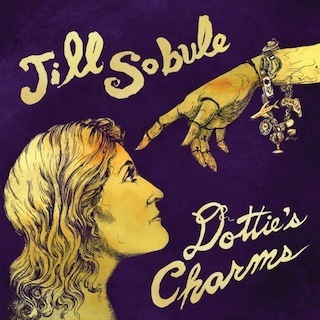 Several years ago, Sobule was given a vintage charm bracelet by a friend who found it on eBay. The bracelet contained a rather diverse and peculiar collection of pewter charms and one vague link to its original owner, apparently named Dorothy. Failed attempts to track down the mysterious Dorothy followed, leaving Sobule to speculate herself what was the origin of each of the bracelet's charms, which include an office chair, a jet plane, the Statue of Liberty, a wedding ring and a stirrup. Who was this lady? What is the story behind each of the (presumably) carefully chosen charms? Answering such questions is the basis of Sobule's latest album, "Dottie's Charms," released May 6.
Several years ago, Sobule was given a vintage charm bracelet by a friend who found it on eBay. The bracelet contained a rather diverse and peculiar collection of pewter charms and one vague link to its original owner, apparently named Dorothy. Failed attempts to track down the mysterious Dorothy followed, leaving Sobule to speculate herself what was the origin of each of the bracelet's charms, which include an office chair, a jet plane, the Statue of Liberty, a wedding ring and a stirrup. Who was this lady? What is the story behind each of the (presumably) carefully chosen charms? Answering such questions is the basis of Sobule's latest album, "Dottie's Charms," released May 6.
But instead of crafting this woman's story herself, Sobule turned to her literary friends and favorites, calling on writers to create Dorothy's life as they saw it. Each writer selected one charm and wrote its lyrics, with Sobule taking those lyrics, adding music, and voila – a collection of songs emerged that paints a portrait of a lovelorn and wandering soul. Despite coming from a diverse group of voices, the final product is a cohesive and immensely entertaining journey through the life of an imagined and fully realized character.
A witty and prolific lyricist herself, some folks have said they miss Sobule's own words on this project. However, I don't see it as a departure from style, but rather an intriguing excursion that is still undeniably a Jill Sobule album. [You may remember Sobule from her biggest hits, "Supermodel" and "I Kissed a Girl" (no connection to the Katy Perry song), back in the '90s. She's churned out solid albums ever since, even if she hasn't landed atop the charts in a while.]
A limited-edition vinyl version of "Dottie's Charms" was released on Record Store Day in April, and of course my local shop, Sullivan's Records (shout out!), received a whopping zero copies! Thankfully, just as it led Dottie's charms to Jill Sobule, eBay provided me with a copy of this cool mash-up of music and literature. (Speaking of mash-ups, whaddya think of the one of Jill and me above? Oh, the things you can do with Pic Stitch!)
Contributing writers include James Marcus, Vendela Vida, Jonathan Lethem, David Hajdu, Sara Marcus, Luc Sante, Mary Jo Salter, Nina Mehta, Sam Lipsyte and Rick Moody.
You can get "Dottie's Charms" on iTunes and Amazon – and you totally should.

